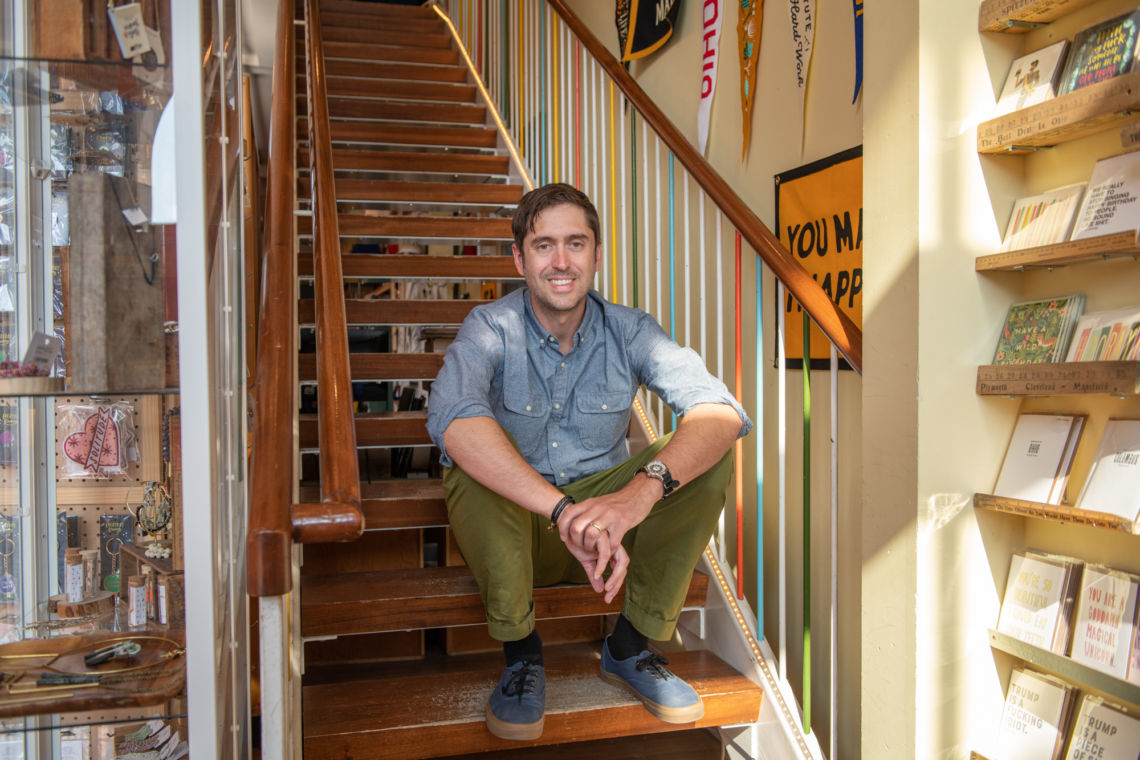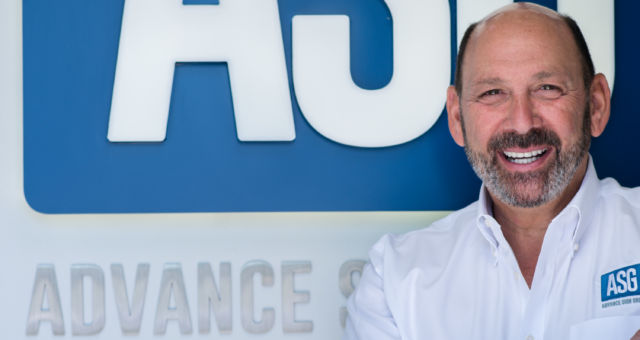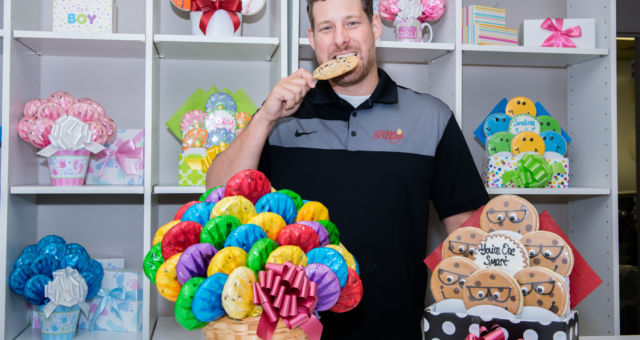What is your full name, title, and business name?
Josh Quinn, Co-Founder at Tigertree & Cub Shrub
Follow Tigertree on Social: Facebook | Instagram
Follow Cub Shrub on Social: Facebook | Instagram
Give us a summary of your business in 200 words or less.
My wife, Niki, and I build community centric retail businesses that believe in building authentic relationships and delivering an amazing customer experience. We utilize in-store events and unique products to bring like-minded people together.

How did the idea for your business come about?
Our first business together was a wholesale accessories brand out in LA. We were always in retail environments due to that company and it sparked the passion in both of us to create a unique environment of our own. Niki went to OSU and we planned to spend six months here writing a business plan for our first shop on the East coast. We went to one Gallery Hop and compared rent prices and area demographic data between The Short North and the cities we were considering. We already loved living in Columbus, so it just seemed like we’d be foolish to leave.
What was the turning point for your business? Was there a moment you knew you had something special?
There have been so many. For the wholesale company, our first New York Times article was a pretty big boost. We were relatively new to Columbus when that hit and I think it gave our retail store a lot more credibility. It also landed us in both Bergdorf Goodman and Henri Bendel. As people trained in neither design or retail just sort of figuring it out, that was a pretty big affirmation. For Tigertree, the move to High Street was huge for us. Cub Shrub has just been such a joy and so well received from the start.
What does it mean to you to be an entrepreneur and business owner?
Boy, that is complicated! At its root, entrepreneurship is problem solving and I actually think it’s different than business ownership. I think a lot of business owners are just taking advantage of an opportunity. Like the coffee shop in the 1000 room hotel that serves an awful product for way too much money because they can due to a captive audience. An entrepreneur looks for opportunities, but they capitalize on them by making a situation better.

What does the city of Columbus mean to your business?
I don’t think we would have survived the larger cities we were considering initially, especially considering the economic meltdown happened about a year after we opened. I think Columbus, for as large as it is, is pretty accessible. Just last night we had Council Member Liz Brown at our store for our fireside chat series, CWIP. For the most part, the leaders seem pretty engaged and willing to meet you at the table and hear you out. In larger cities, everyone is just looking out for themselves and figuring out how to scrape a little off the top for them. I honestly feel like businesses and customers alike look out for each other because we’re all invested in growing what we have.
Are you from Columbus? If not, please explain what brought you to here and ultimately what made you stay.
I was born in Asheville, NC. My dad worked for the railroad and we moved about every year until I was in middle school when we ended up in central Illinois. My wife is from the Wooster area and went to OSU before joining me in LA. Really one Gallery Hop was all it took for us to stay. The Short North at that point (2006) was so exciting. It really felt like all of the hard work people like The Wood Companies, the City, and the long standing retailers and residents had put in was about to pay off in a big way.
What’s the number one piece of advice you’d give to anyone wanting to start a business?
Don’t be afraid to set boundaries. Your business can turn into that abusive friend or partner who will take everything you’re willing to give. Being over 15 years into business ownership, I’ve seen far too many people wreck just about every relationship in their lives and it ends up wrecking them as a result. If you have good ideas and a good work ethic, success will come if you’re willing to be both strategic and patient. The people that don’t set boundaries and go for broke in the beginning often get written about for their quick success but they almost always lose in the long run. I’d much rather have a good circle of friends and a good relationship with my kids than another location and a little bit more money. It’s actually why we closed our Short North Cub Shrub this year.
What do you wish you knew about entrepreneurship before starting your business?
Delayed gratification wins every single time. Especially if you are young, try and hold on to your standard of living as long as you can. It can be so appealing to take that amazing vacation or buy a new car as soon as you have enough money in the bank to do so. Leave as much money on the table as you can and reinvest it back into your core business as well as establishing diverse income streams off the bat. This is difficult to do because you’ll naturally find friends in a similar stage of their business. You’ll likely help each other out and start growing at similar rates and then they’ll have a bunch of toys you don’t have. But, if you do it the right way, in ten years time your toys and stress level will be a lot better than theirs. Also, if a financial downturn occurs, you’ll be in a position to ride it out, but if they are all in on one business they likely won’t.

What’s the most challenging part of your business (i.e, what keeps you up at night)?
Since I started focusing on finding balance, I don’t often have sleepless nights. Not from business anyway. I don’t sleep a lot, but it’s no longer from worry. There might be times a deadline is looming and the extra pot of coffee goes on after dinner, but I’ve gotten pretty good at telling myself “if I am not going to get out of bed and work on it now there is no reason to dwell on it until I am ready to do something about it.” Decision fatigue actually makes it harder for us to function the more decisions we make in a day and gets more or less reset with sleep. So really, for a problem big enough to keep you up at night, the worst thing you could do is try and solve it when your brain is mush from thinking about it and other problems all day. The single best thing you could do for the problem is to go to sleep and attack it in the morning, when your mood and brain are both in a better position to do so.
Every business owner has a flaw. What’s yours?
When I am passionate about something I am the best person to have on your team. But my passion dictates what I am working on more often than it should, so I really have to wrestle with myself to property prioritize what I need to accomplish in a day.
Why do you think most business owners fail? What has made you different?
Before this past year I would have said “they couldn’t handle the necessary sacrifice” but I am discovering a way to do this that doesn’t require so much of that. Well, it might require you to sacrifice some income potential, but for the return of great relationships and a better life it’s worth it. Anyway, I think it depends on at what point in the journey they are failing. There is still some truth to the sacrifice in the beginning. At least with someone’s first business, it’s pretty hard to know what needs to be outsourced before you do it yourself and you likely don’t have the cash to do it anyway or the revenue to support the decision. Medium-term failure (let’s say 5 years) is usually a loss of passion in the business. Long-term failure I think is some mix of greed causing them to keep too much cash that should have been reinvested, causing an overwhelming amount of maintenance issues to pile up and too much sacrifice burning your social safety net and relationships.
I also don’t think we talk about that word, failure, enough or really understand it. I’ve known dozens of business owners who have moved on without selling. From the outside that’s a failure but most people I know that have moved on from their business are happier than they were when they had it. They either learn from their mistakes and build something that better suits their needs or they learn they weren’t right to own a business and get a regular job and that’s great too.
What was your biggest mistake and what did it cost you?
If I am being totally honest I can’t think of a single mistake I didn’t learn something from that earned me more than it cost me. I’ll try just about anything. We launched a weird free bike share program in the Short North about 10 years ago with a few other businesses called Everyone Bikes. I spent a whole summer rehabbing an airstream for a mobile shop without researching the rules around operating it in the way I planned; I’ve had sub brands with other people not work out and on and on and on.
The worst thing an entrepreneur can do is be frozen because they are afraid of mistakes. Most recently, we’ve started to try and figure out how to make video a more integral story telling tool for us. I’ve been saying we should do it for years, but it took just shooting the first one to start figuring it out. The first one was terrible, but I figured out from the steadiness I needed a gimbal, from the sound what mic I needed, and from that research I got a better lens and app and now we’re producing great videos. We learn far more from our mistakes than our wins. If you want to grow your business, stop being so afraid of mistakes.
What tool has helped you the most for your business?
I am probably most into Klaviyo right now. We’re using it for Cub Shrub but not Tigertree yet and it’s a much cleaner tool for emails.
When did you know it was time to expand your business, make your first hire, etc.?
I don’t think we had our first employee for Tigertree for 2-3 years. We’d have a friend watch the shop for us so we could go to a trade show, but that’s about it. I am sure, like most people, the first hires were at the point we could afford it. We’ve expanded Tigertree twice and those were largely based on the opportunities arising. Cub Shrub really grew out of Tigertree and like many kids retail businesses, we just saw an underserved need in Columbus.

What is something that you did that was a game changer for your business?
For Cub Shrub, it was for sure consolidating because we were stretched too thin. That business was doing well in both locations, but being able to focus attention really solved a lot of problems. Tigertree has just been such a gradual growth it’s hard to say. We’re working on something now that I think will be my answer next time we do this.
What was an idea that you spent a lot of time on or thought would make a big difference in your business that didn’t pan out?
I covered a lot of this in the mistakes section. When I lived in LA I did commercial acting and I learned in that environment that it often takes dozens of auditions for one thing to work out.
What is something that your business spends a lot of money on that’s worth it?
Rent for the right locations.
What is something you’re working on now that you’re very excited about?
We just started a new series called Conversations With Interesting People at Tigertree and it’s one of those “if I get to do this, this business is worth it” kind of things. When we started we did a ton of community events and workshops, but just kind of fell off of it as we got busier. I am glad to be returning to our roots and this series in particular. We’ve always had a floor environment where interesting people stop in, I’ll often start a conversation with them, and the staff and then customers will join in. I don’t think our level of candor or openness is very common. Sometimes it catches people off guard, but I think it’s appreciated by the people that get it. This chat series is meant to mimic that in a more intentional setting.
What form of marketing is the most valuable for you?
Word-of-mouth should be everyone’s most valuable form of marketing. Giving people such a good experience they have to talk about it is something you won’t have to spend much money on and won’t have to invest much money in other forms of marketing for a while.
Who is your best Columbus resource (accountant, lawyer, marketer, etc.)?
I really love the O’Molesky Law Firm. They are super fair and seem to really care about their clients needs and businesses.
Who do you vent to when you have a business problem?
I am sure the world at large reading this will say “who don’t I vent to when I have a business problem?” I am fortunate to be in a group of world class entrepreneurs called MMT. I’d really suggest to everyone to find some sort of mastermind or group of people you feel aligned with like that. The good ones are always expensive, but the first major tax question or marketing tip or whatever you get from the group will provide enough value to pay for it. So I don’t know if I exactly vent at large to that group, but I certainly find solutions there. I’d say Steven Weaver from the Candle Lab is probably aware of just about every problem I’ve faced in the last 10 years.

Where do you see your business in the next 10 years?
It’s funny I literally just finished my new five-year-plan this week, so I have a much clearer picture of this than usual. If it’s allowed to plug my personal blog on here, check out balancingscale.com and and look for the post on five year plans. I have a blog dedicated to helping entrepreneurs find balance in business. Tigertree is about to undergo some pretty amazing changes on top of the return to making it a community space. Cub Shrub I think is going to be doing what it’s doing now and just getting a little better every year. Five years ago, we were sure we wanted to have at least one national brand. Now we’re more focused on stepping back a little bit and enjoying our family while the kids are young and we’re able to. At least right now, I hope that in 10 years we’re still running Tigertree at 787 N. High St. and Cub Shrub at 1257 Grandview Ave serving most of the same people we are right now. Businesses grow or die, but that growth doesn’t have to be financial.
What is your revenue range?
$1mm – $5mm
When you’re stressed or overwhelmed, what do you do to overcome this feeling?
I recently read The Miracle Morning For Entrepreneurs and would recommend it to everyone. It helps you establish a morning routine to prevent you from being stressed or overwhelmed in the first place. I think that feeling stems from a lack of preparedness, so the more planning you can do the less likely you’ll end up there. I’ll share one very specific thing I do that I think helps – I actually have a business anxiety journal. I also do the five minute journal for gratitude and keep a more standard narrative journal. However, in the anxiety journal, as soon as I get to “that” place, I start writing my expected outcome. In general, actually writing it down lets the logic centers of my brain take back over. 100% of the time either the bad outcome didn’t occur or it did but really wasn’t so bad.
What’s your end goal with the business? Is this something you want to pass down to your kids or would you like to eventually sell?
I don’t know right now. I am honestly so excited about what is going on at Tigertree and optimistic about what is going to happen in the Short North over the next couple of years. I am happy where I am for now. As I mentioned earlier, I think I’ll be a little less involved in the day-to-day within five years which will, in part, free me up to do more writing and speaking, but I think much of that work will only funnel success back into the stores. Niki and I have finally found a good groove with the two shops where I am largely absent from day-to-day tasks at Cub Shrub and just do behind the scenes stuff and help out when needed and kind of the same thing with her at Tigertree. So I think we’ll just enjoy this phase for a bit before we really talk about the future.
How would your business fare if the economy hit a nasty downturn like it did in 2008? Have you prepared for this?
Well, we actually experienced double digit growth from 2006-2016, including 2008-2009, but I don’t think we’ll fare quite as well with the next one. That was growing from nothing which is always easier than maintaining something that actually has some weight to it. The Short North construction of the past couple of years probably taught us more than that earlier period. It was different in that we knew it was coming and made arrangements several years ago and have largely hit the targets we expected to revenue wise. But, it exposed some faults we didn’t really understand before. Neighborhoods are like social networks and big impacts like what we are experiencing are like changes to the algorithm. I think we are as good or better than anyone at giving great service and an unexpected experience to a large audience. I don’t think we did enough to transition that traffic onto channels that we controlled and when the traffic changed we weren’t prepared. While it’s true we’ve hit our revenue targets (which were down), I’ve come to the conclusion that downward shift wasn’t necessary. There are a few businesses in the neighborhood thriving despite the challenges who I think did a better job than us at clienteling and controlling their own messaging, so that is really a focus for us moving forward. We’re luckier than most in that regard in that now that traffic is rebounding as things are clearing up we’ll get a second chance.

What other entrepreneur do you look up to most?
If you don’t know the story of Sirius XM‘s founder Martine Rothblatt, look her up. While I wouldn’t really say I’ve modeled my business after her, like a lot of other business leaders, or really look to her for guidance, in terms of the idea that Entrepreneurs can solve any problem, she is the poster child. She’s a badass trans woman who totally rethought what radio in our cars could be – which in a field still largely run by older white men, is pretty amazing. But here is where things get absolutely amazing – she literally saved her daughters life. Her daughter was diagnosed with pulmonary arterial hypertension, which was formerly thought to be incurable and she found a cure herself! With a three month life expectancy, she literally got a ton of biology books and solved a fatal illness to save her child. Oh and she built a robot copy of her wife.
If you had to tell a visitor one thing to do/see/eat in Columbus, what would it be?
Get a realtor and start planning their move.





